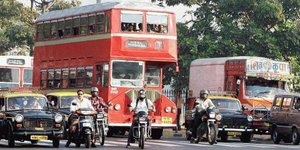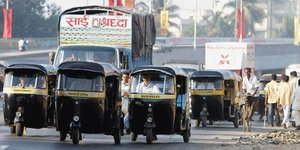Public transport in Mumbai
|
|
Public Transport in Mumbai involves the transport of millions of citizens of Mumbai. Most of the citizens use public transport as only the elite can afford cars.
| Contents |
Road transport
History of public road transport
Before 1920
The Bombay Tramway Company Limited was formally set up in 1873. After a contract was entered into between the Bombay Tramway Company and the municipality, the Government of Mumbai enacted the Bombay Tramways Act, 1874, under which the Company was licensed to run a tramway service in the city. The tram-cars were of two kinds—those drawn by one horse and those drawn by two. In 1905, a newly formed concern, The Bombay Electric Supply & Tramways Company Limited, bought the Bombay Tramway Company and the first electrically operated tram-car appeared on Mumbai's roads in 1907. The passing years aggravated the problem of rush-hour traffic and to ease the situation, double decker trams were introduced in September, 1920.
1920-1940
Mumbai saw its first bus run on 15 July 1926. The people of Mumbai received the bus with enthusiasm, but it took quite some time before this means of conveyance really established itself. For several years, it was looked upon as transport for the upper middle class. Those were the days when the tram was the poor man's transport; it carried one all the way from Sassoon Dock to Dadar for a mere anna and a half, that was nine paise. The bus fare for the same journey was four annas, that is 25 paise.
In response to the pleas made by the Government and the Brihan Mumbai Mahanagarpalika, the Company extended its services to the northern part of the city in 1934. Double deck buses were introduced in 1937 in order to cope better with the growing traffic. The first Limited Bus service in Mumbai, and probably the first in the country as well, started running in 1940 between Colaba and Mahim.
Post 1940
Pursuant to the option given to it under the Deed of Concession granted to the Bombay Electric Supply and Tramways Co.Ltd, the Brihan Mumbai Mahanagarpalika acquired on 7 August 1947, the assets of the combined Undertaking, namely the operation of tramways and distribution of electricity in the city of Mumbai as a going concern. By mutual agreement, the Corporation also took over the operation of the bus services, which was run by the B.E.S. & T. Company Ltd.
Thus, the Bombay Electric Supply and Transport Company was municipalised and came to be known as Bombay Electric Supply & Transport Undertaking.
When the Corporation took over the Company in 1947, there were 242 buses in operation on 23 routes and these buses carried 2.38 lakh passengers per day. At present, there are 3380 buses carrying 45 lakhs passengers daily on 335 routes. With the change in the name of the city from Bombay to Mumbai, the organisation is now known as The Brihanmumbai Electric Supply & Transport Undertaking (http://www.bestundertaking.com).
Number of taxis (cabs): 30,000-45,000


